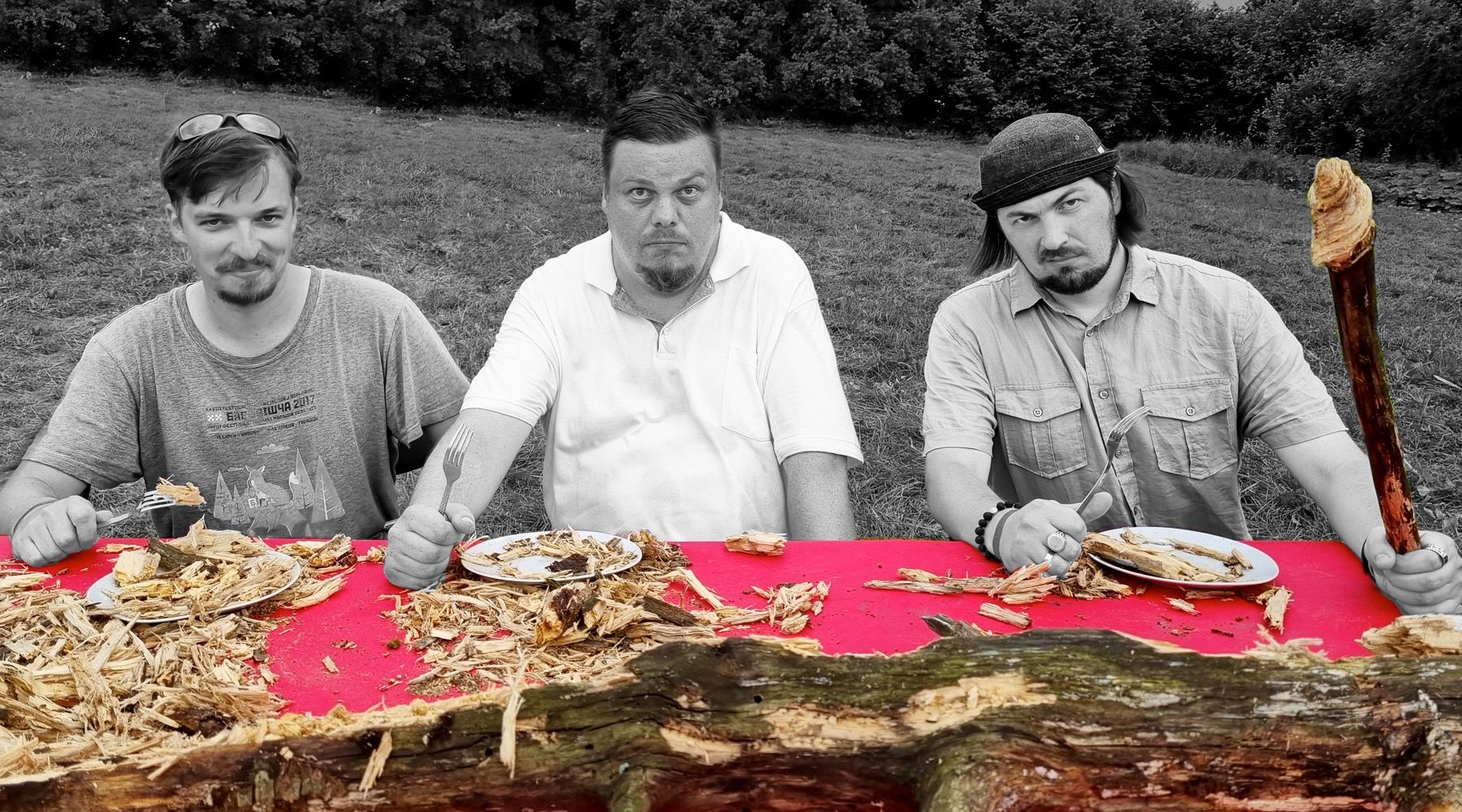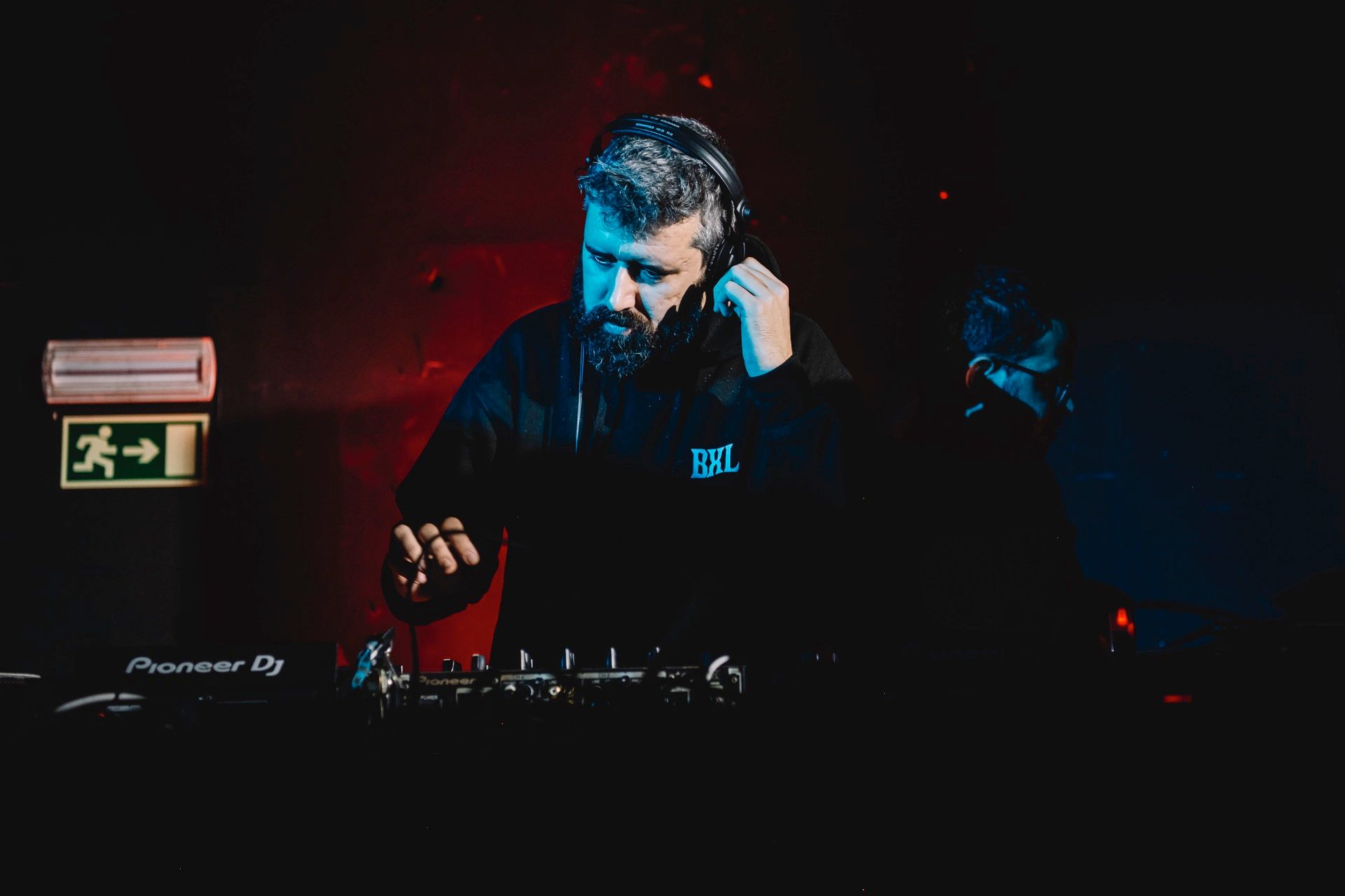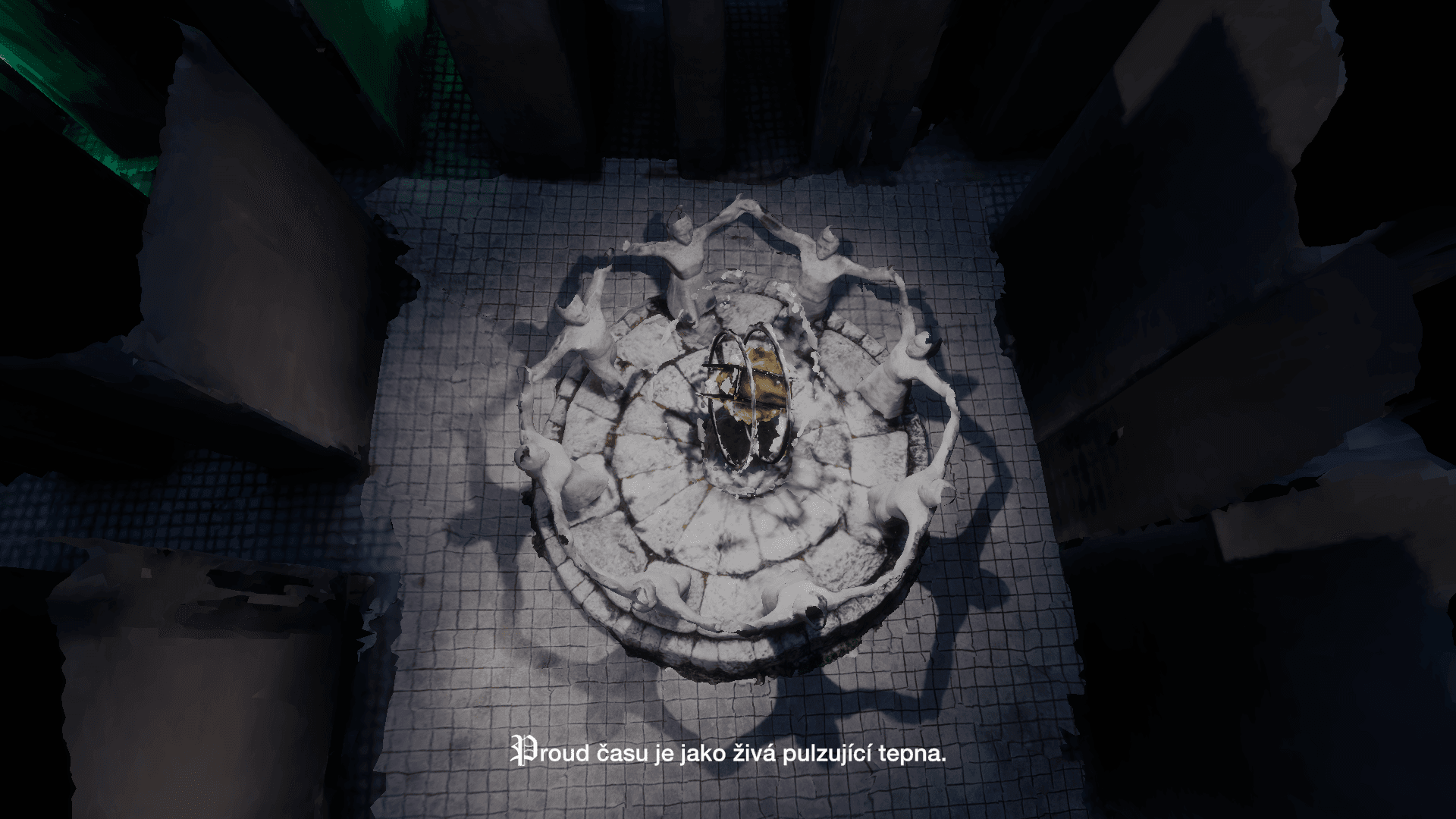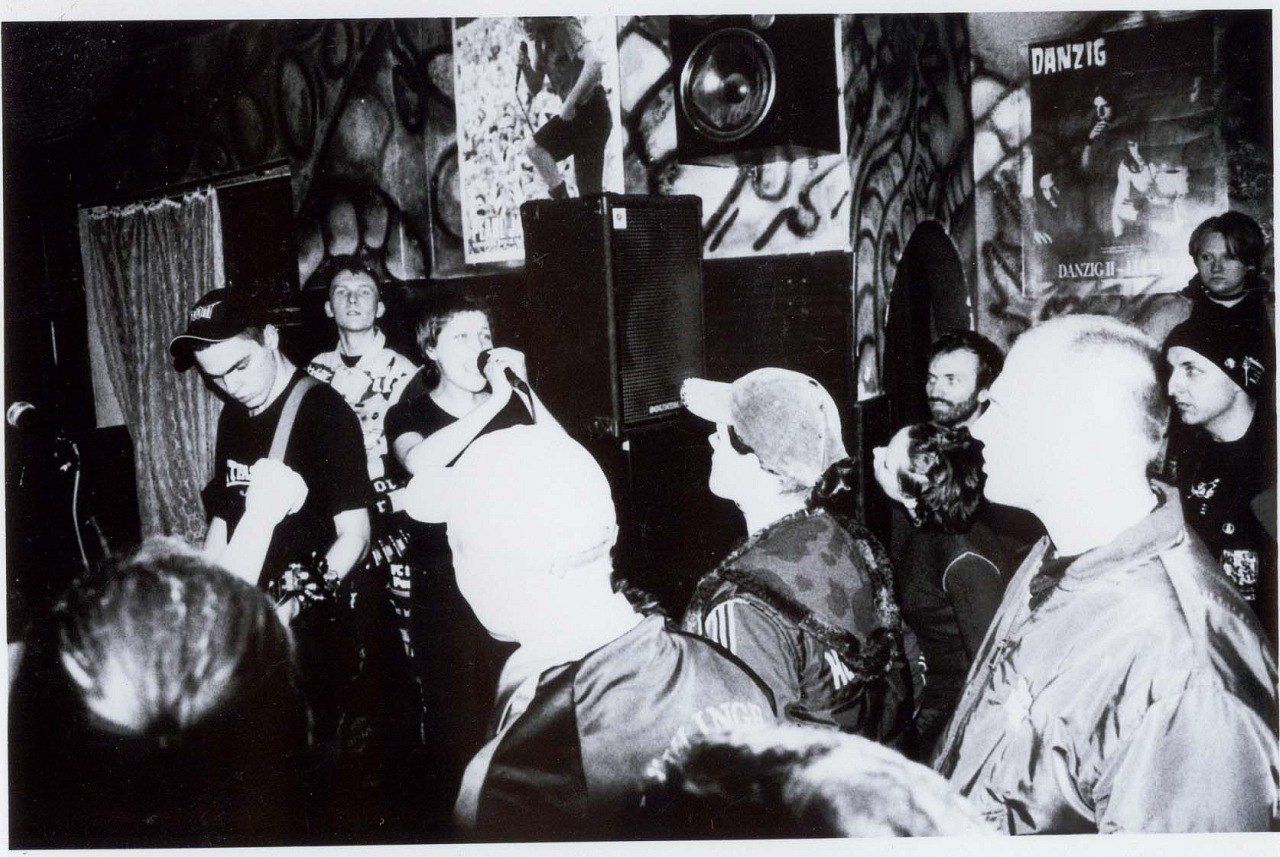Kolorit Kulmana: the paradoxes of improvisation
An interview with one of the most unique contemporary Belarusian bands.
Kolorit Kulmana is a true enigma within the Belarusian music scene. They release multiple albums each year, and each one is "something completely different" – ranging from ambient soundscapes and cosmic rustling to layered guitar orchestrations and kraut-electronic journeys around Earth’s orbit. One thing remains constant: every release is an improvisation, recorded live in the moment, with a grandeur and precision that feels as if a high-tech alien ship the size of a city has suddenly landed in your backyard. We sit down with the band’s creators, Raman Žarabcoŭ, Serge Mokrinsky, and Zmicier Charevič, to dive deeper into their creative process.
You can listen to the full audio version of the interview in Belarusian and Russian as part of the Radio Plato Editorial Podcast:
<iframe width="100%" height="166" scrolling="no" frameborder="no" allow="autoplay" src="https://w.soundcloud.com/player/?url=https%3A//api.soundcloud.com/tracks/1938645632&color=%23ff5500&auto_play=false&hide_related=false&show_comments=true&show_user=true&show_reposts=false&show_teaser=true"></iframe><div style="font-size: 10px; color: #cccccc;line-break: anywhere;word-break: normal;overflow: hidden;white-space: nowrap;text-overflow: ellipsis; font-family: Interstate,Lucida Grande,Lucida Sans Unicode,Lucida Sans,Garuda,Verdana,Tahoma,sans-serif;font-weight: 100;"><a href="https://soundcloud.com/radioplato" title="Radio Plato" target="_blank" style="color: #cccccc; text-decoration: none;">Radio Plato</a> · <a href="https://soundcloud.com/radioplato/radio-plato-editorial-podcast-122-w-kolorit-kulmana" title="Radio Plato - Editorial Podcast #122 w/ Kolorit Kulmana" target="_blank" style="color: #cccccc; text-decoration: none;">Radio Plato - Editorial Podcast #122 w/ Kolorit Kulmana</a></div><h2>No boundaries, no limits</h2>– How did Kolorit Kulmana come together as a band?
Raman Žarabcoŭ: I should start by saying how we got acquainted in the first place. We were all playing in the Minsk Improvisers Orchestra (MIO), led by Alaksiej Varsoba at the time. It was pure free improvisation: no boundaries, no pre-defined rhythms, or melodies. No patterns. That's where we met, started talking about music, and at some point decided to play together, but with our own twist – with some pre-defined rhythmic structures. Serge was holding down the rhythm with his electronic gear, Zmicier on saxophone, I decided to play bass. I love bass guitar, although I also play guitar and synthesizers. But I'm best at improvising on the bass – it is really my instrument. So, we came together in March 2020. We came to the rehearsal and just started playing, basically without any discussions prior, and stumbled upon sort of a sound.
<iframe width="560" height="515" src="https://www.youtube.com/embed/56qAwE2SENc?si=jX8OjFAAKmlQGAu-" title="YouTube video player" frameborder="0" allow="accelerometer; autoplay; clipboard-write; encrypted-media; gyroscope; picture-in-picture; web-share" referrerpolicy="strict-origin-when-cross-origin" allowfullscreen></iframe>Serge Mokrinsky: In Kolorit Kulmana, we worked on rhythms, harmonies and melodies starting with free improvisation. It was in the center for us, then we would think how it could lead to something more structured. Everyone would contribute from his unique experience, with everyone having a different musical background. We all listen to different types of music, and we mix all of that with free improvisation. At first, we would just get together and play without any real plan. Then we reached a point where we thought, 'Okay, now let's come up with something,' and strated thinking of concepts. They could be mood-based concepts – like conveying a specific feeling during the session; or more technical ones. One such example is the session called 4x6, which means six-string guitar times four. We decided to play only electric guitars in this session, while Zmicier and myself are no guitarists. But we are both well versed in effects and working with sound in general and we knew what emotions we wanted to convey. So we complemented the other two actual guitarists. This turned out to be an interesting story.
<iframe style="border: 0; width: 100%; height: 340px;" src="https://bandcamp.com/EmbeddedPlayer/album=3732276928/size=large/bgcol=333333/linkcol=ffffff/artwork=small/transparent=true/" seamless><a href="https://koloritkulmana.bandcamp.com/album/4-6">4×6 by KOLORIT KULMANA</a></iframe>– What was each of you doing before Kolorit Kulmana? What's your background?
Raman Žarabcoŭ: I was playing a mixture of rock, electronica and pop in SnopSnoŭ. And I was already starting Syndrom Samazvanca – the band that is my main occupation currently – back in the day when we started Kolorit Kulmana. Guitar and bass guitar are my main instruments, although I also got into synthesizers, effects pedals and experimenting with sounds.
Zmicier Charevič: I'm a typical IT guy who was always into music but never played it. It was only in the Improvisers Orchestra that I found out how I liked making music. I decided to take up the saxophone, which is kind of a cheater's instrument if you have the money to buy one. The learning curve on it is not too steep, I would say. I've played sax in MIO, using it for all sorts of effects, or to fill up the background. There's something vocal-like about this instrument, I would sometimes get into those territories as well.
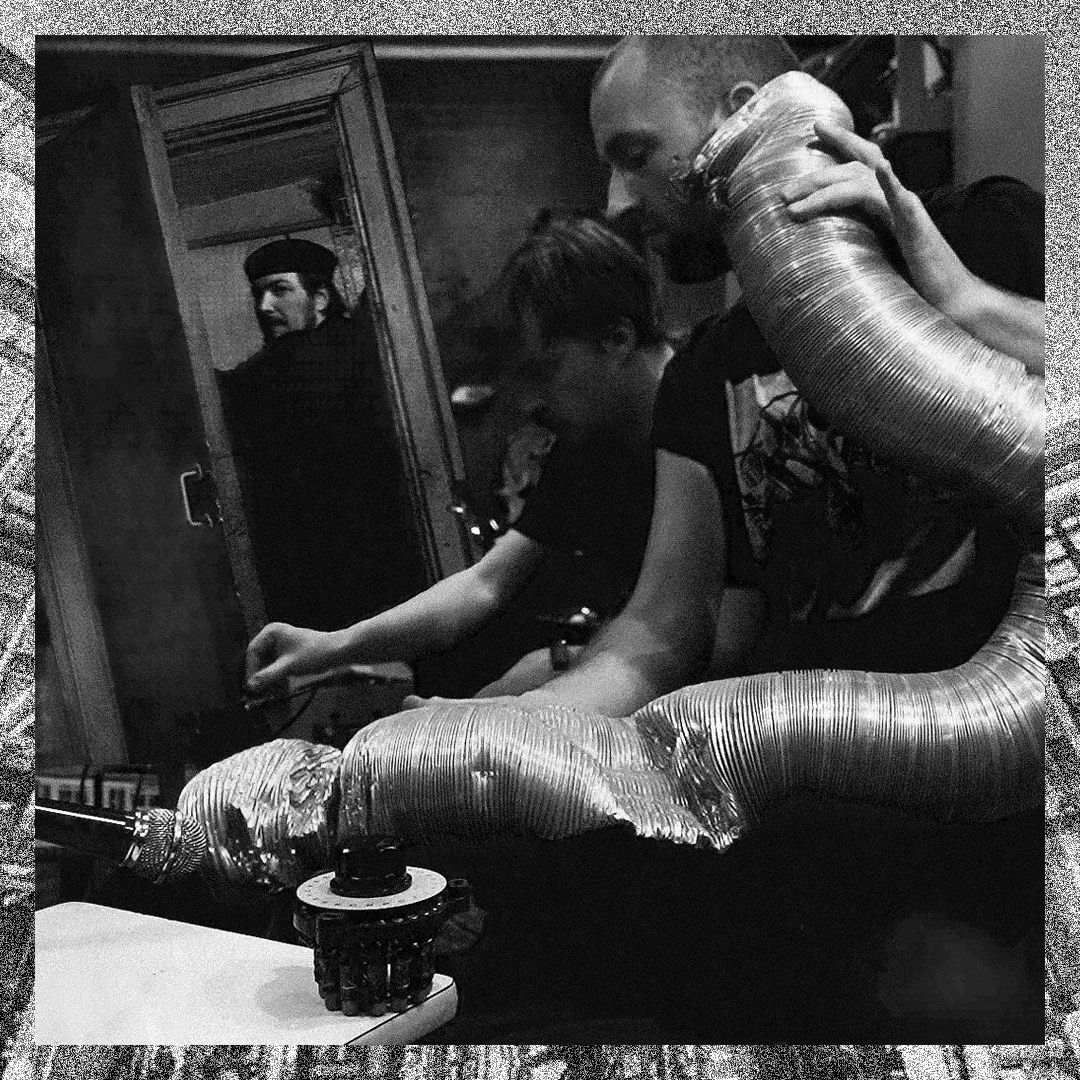
Serge Mokrinsky: I've been into music since chidhood. I would tinker with my parents' piano and my brother's guitar, scratch vinyl records on the turntable. Then I got into computers and DAWs. I was never stuck on one instrument or another, I would rather work on ideas and atmospheres, whatever the tool was. When I was 18, I would listen to a lot of kraut rock and dream of one day being able to play like Can. After playing in the Improvisers Orchestra, I realized that there are no boundaries in music. You are free to do whatever you want, regardless of the instruments or software. This was my moment of realization. There are no limitations; you can enjoy yourself by experimenting even without professional instruments. Improvisation and the type of fun we're in Kolorit Kulmana – that's really my thing.
<h2>Uniqueness of a moment</h2>– Kolorit Kulmana brings back being in the moment, in our digital age when everything can be easily instantly recorded to be replayed or reworked later. The magic of things happening just once. How do you prepare for that, both technically and emotionally? What's the difference between an improvisation session and rehearsing a piece over and over?
Zmicier Charevič: We discuss our approaches to music among ourselves a lot, and each of us has his own favorite ones. I, personally, have always enjoyed finding cool synth sounds and effects. I really love using the saxophone as a sample that I create on the fly and then process, overlay, etc; sometimes to really exciting results. Improvisational music resonates with me also because I tend to get very in the zone while playing. In MIO we experimented with conducted pieces. I would sometimes get so immersed in the flow that I would stop noticing the conductor during those sessions. My music is like a wall of sounds overlapping in a twirling complex dance.
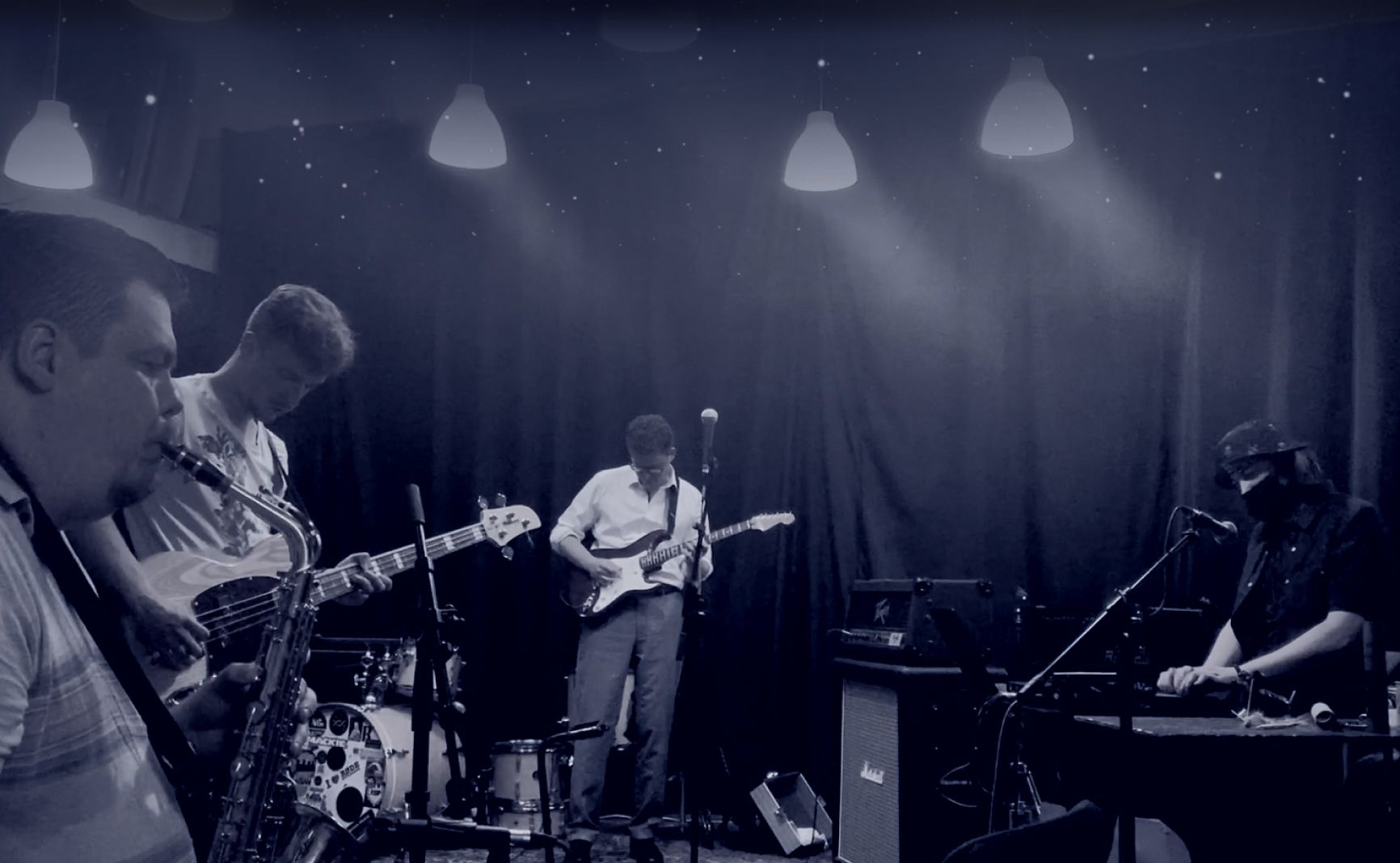
Raman Žarabcoŭ: Turns out, it's pretty hard to come up with completely new stuff while improvising all the time. I learnt that in due time. We sometimes try to plan ahead. Not the setlist, that is, but rather the moods we want to express, or some technical details. But then, something can malfunction and upset the whole plan at any moment. Other times, we would just come into the studio without any plan at all, and the session would turn out amazing.
– But all the planning is only beforehand, right? Once you're playing, there is no stopping or discussion?
Raman Žarabcoŭ: Yes, basically.
Serge Mokrinsky: Sometimes we use signaling gestures while playing to communicate.
Raman Žarabcoŭ: We took that from the Improvisers Orchestra. We use them both in live shows and studio sessions, which are usually more free-form. I really want to differentiate our improvisation from the endless noodlings of jam sessions. I've been to many of those, but they've always lacked some narrative structure for me. I think, some of our best sessions, Radio-Aktivnost in particular, successfully overcame that. There is a huge importance of listening to each other while playing in order to work in the same direction.
Serge Mokrinsky: Once, we held a session in this large space on Mašerava Street with a variety of instruments, including two drum kits and a piano. We were moving around the studio exchanging instruments as we played. The recording of this session is called Kislotny Test. The recording, probably, sounds very ordinary, if you don't know the context of the instrument swapping. Here we started experimenting with two things. First is the swapping of roles and second is coming up with concepts not too tied to the rigid structure of the band. The most interesting things usually happen near the end of a piece, once we're all in the pocket and jamming out like there is no tomorrow. So, to take it all in, you actually need to listen to the whole thing.
<iframe style="border: 0; width: 100%; height: 472px;" src="https://bandcamp.com/EmbeddedPlayer/album=2316366380/size=large/bgcol=333333/linkcol=ffffff/artwork=small/transparent=true/" seamless><a href="https://koloritkulmana.bandcamp.com/album/kislotny-test">Kislotny test by KOLORIT KULMANA</a></iframe>Serge Mokrinsky: Zmicier often says that there are no mistakes in free improvisation. We realized that, when something goes wrong, we can react to that, because we have this connection with each other. If a jam is breaking down, it's not the end, it's a turning point. We have a track called "Nil" dedicated to my son. We recorded it during a session in Maple Tree Studio that we played right after he was born. During the session the power went out in the room and we started discussing what had happened, but suddenly, the sound powers back up and my beat starts playing, and we all catch it and continue from there. This whole accidental breakdown with us talking in silence became a part of the track.
<iframe style="border: 0; width: 100%; height: 120px;" src="https://bandcamp.com/EmbeddedPlayer/album=4152473338/size=large/bgcol=333333/linkcol=ffffff/tracklist=false/artwork=small/track=1367702448/transparent=true/" seamless><a href="https://koloritkulmana.bandcamp.com/album/nil">Nil by KOLORIT KULMANA</a></iframe>– What improvisation means to you in everyday life and how music influences your life in general?
Serge Mokrinsky: I've noticed that I get bored playing without improvising. I've been playing solo (phlegm87) last two years and I've been noticing that there is something missing just playing my tracks live. The intrigue, the element of surprise – the thing that I love most about working with synths and effects. Even when recording my solo releases now, I like to use fragments from my live performances. Because the emotion you achieve improvising live is hard to recreate in the studio. It’s not about virtuosity, it’s about the emotions.
Raman Žarabcoŭ: Funny as it may sound, it was actually Red Hot Chili Peppers that opened my eyes to improvisation. Their live shows, especially John Frusciante era, when they would break into a ten-minute jam in between songs. It was eye-opening for me at the time, and I started trying to replicate that type of playing on guitar and bass, constantly inserting variations in my riffs. I think that improvising is one of the core skills for a musician. Back when Kolorit Kulmana was just starting I was playing in SnopSnoŭ, where everything was way too structured, with no room for improvisation at all. In Kolorit Kulmana I would make up for that in droves.
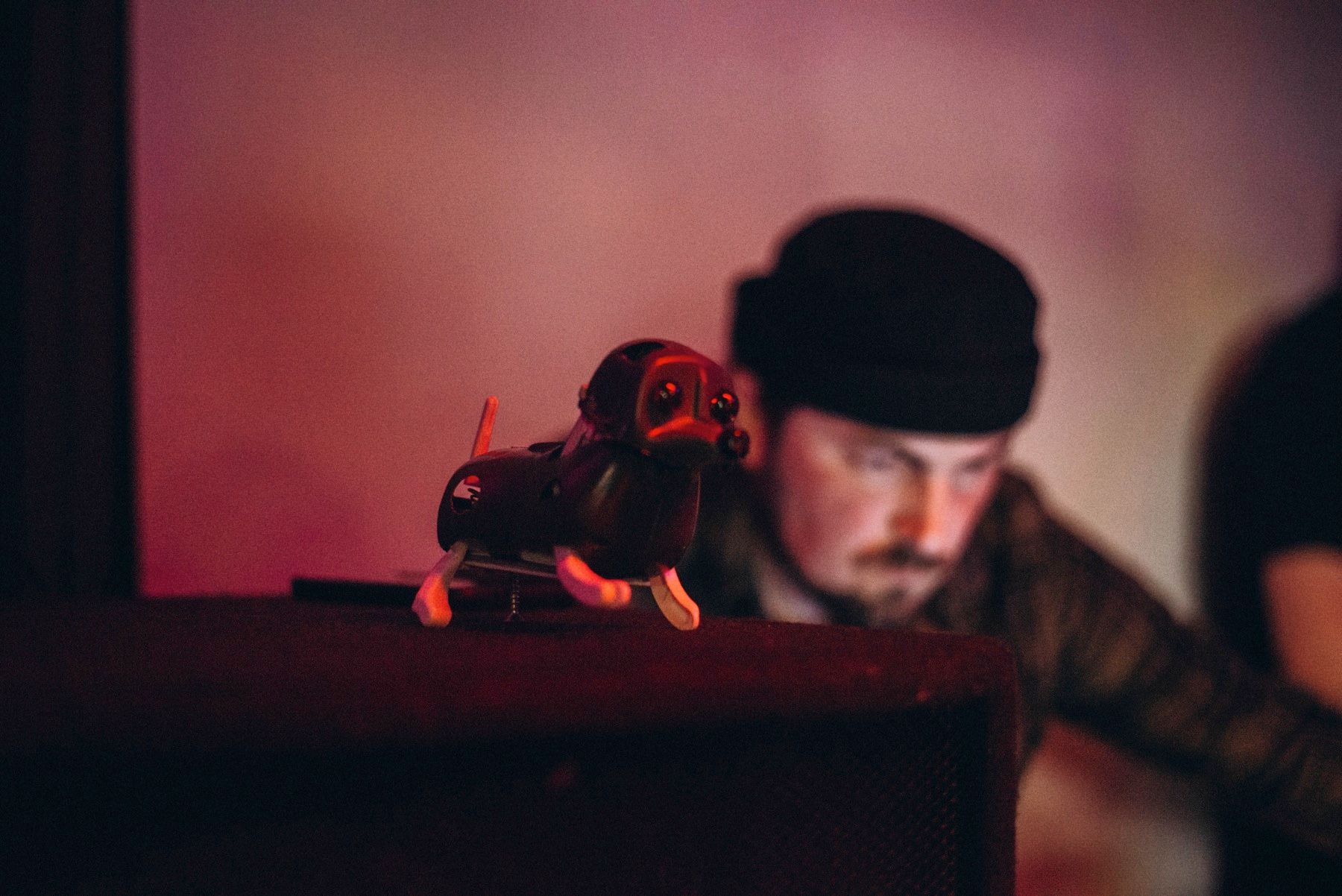
– What's it like being this weird band? Is it hard to fit in with the local scene and the audience? And especially with the promoters and the industry?
Raman Žarabcoŭ: It's not easy. I suppose, even in the better days it was hard to get successful playing the kind of music we do. Throughout our career we would get gigs at various odd shows and we always felt out of place, whether we would be playing at a dance party or a rock show or a jazz evening.
Serge Mokrinsky: Unfortunately, the local experimental scene has pretty much fallen apart at this point. We had an experimental scene in Belarus in the past. A bunch of electronic projects by people like Vlad Buben and his associates, Leanid Naruševič and his band Knyaz' Myshkin and that whole scene. We are the supposed heirs of that movement, the next generation. But it feels like our audience is now elsewhere.
The avant-garde, experimental, and improvisational scene is absent here, and unfortunately, we missed it. We kept on playing gigs in various venues but it always felt like we weren't exaclt the right fit. The organizers would come up to us after a set and say 'That was nice, especially the trip hop parts, but sorry, guys, you sound a bit out of tune'. What do you say to that? Or how about playing at a sushi bar for two people? I could fill a book with these types of stories. The track “Odinokij Piotr”(lonely Piotr in Russian – translator's note) is inspired by that, he was our only fan in the audience.
<iframe width="560" height="515" src="https://www.youtube.com/embed/5U_ROOpRASc?si=AvbNS8hSZOqEVVX7" title="YouTube video player" frameborder="0" allow="accelerometer; autoplay; clipboard-write; encrypted-media; gyroscope; picture-in-picture; web-share" referrerpolicy="strict-origin-when-cross-origin" allowfullscreen></iframe>Zmicier Charevič: Back when we started in March 2020, it felt like things were finally looking up. New venues were opening that promoted contemporary art. We thought that maybe MIO would spawn a bunch of groups. The Orchestra's shows had built a following. Maybe not hundreds of people, but dozens would turn up regularly, many of them stayed to the end. We felt like there was a potential and things would keep developing, like in Europe. Overall, things seemed positive, but unfortunately, many venues in Miensk have since closed – we often played at their final events. It felt a bit like we were closing the curtain.
Raman Žarabcoŭ: We have an inside joke that our band is cursed. The events and venues we play usually close down shortly afterwards.
– I hope Radio Plato will be just fine after this interview.
<h2>Rolling drums</h2>– Let's talk about your side-project Kubar' and a collaboration with a Belarusian famous drummer Arсiom Zaleski.
Raman Žarabcoŭ: We decided to single it out as a more live, less electronic type of project. We wanted to create something like a rock band but without actual rock.
Serge Mokrinsky: Kubar' is the name that Arсiom came up with. He had been bearing it in mind for a while, coming up with all sorts of meaning and interpretations for it. We wanted to make a project that we could play any club with. In Kolorit Kulmana I work with loops and samples a lot, but in Kubar' I play completely live, just like the other guys.
We have put out two Kubar' releases: the white one and the black one. The white one is more structured, almost chorus/verse, which makes it sound almost rehearsed. The black one is more psychedelic and out-there. We used some conducting techniques on the white one. We would use cards with our initials to switch parts and to direct the dynamics of the piece. All this would create unexpected structures and add some degree of control to our music.
<iframe width="560" height="515" src="https://www.youtube.com/embed/PlJ5dz05lhQ?si=faU2F7Vym5O-0Iqx" title="YouTube video player" frameborder="0" allow="accelerometer; autoplay; clipboard-write; encrypted-media; gyroscope; picture-in-picture; web-share" referrerpolicy="strict-origin-when-cross-origin" allowfullscreen></iframe>Raman Žarabcoŭ: I wanted to point out how great of a musician Arciom Zaleski was. We are very lucky to have played with him and very sorry it had to end so quickly (Arciom Zaleski passed away in February 2022 – editor's note). His works, including the Kubar' releases, have became some of my favorite music ever. I still keep wondering how we managed to create that when I listen back to those sessions.
Serge Mokrinsky: Once, we showed up for a concert, and all we had was Raman’s bass part. We had literally only decided to play together during the sound check. Raman turned to Arciom and said, “Arciom, you need to play drum and bass.” Arciom was an incredible musician; he picked up everything on the fly and didn't need any explanations – he just played the right thing right away. There’s a recording from that show where we played a cover of Omar Rodriguez Lopez, and, honestly, I think it sounds even better than the original.
Raman Žarabcoŭ: Frankly speaking, playing with other musicians was never the same for us after Arciom, with all due respect.
Serge Mokrinsky: Sometimes it's cool to jam together, but that special kind of chemistry we had with Arciom is hard to come by. You can have a bit of fun, but that sense of unity while improvising is a rare thing. I have come to appreciate Kolorit Kulmana as something really special only after playing with other people.
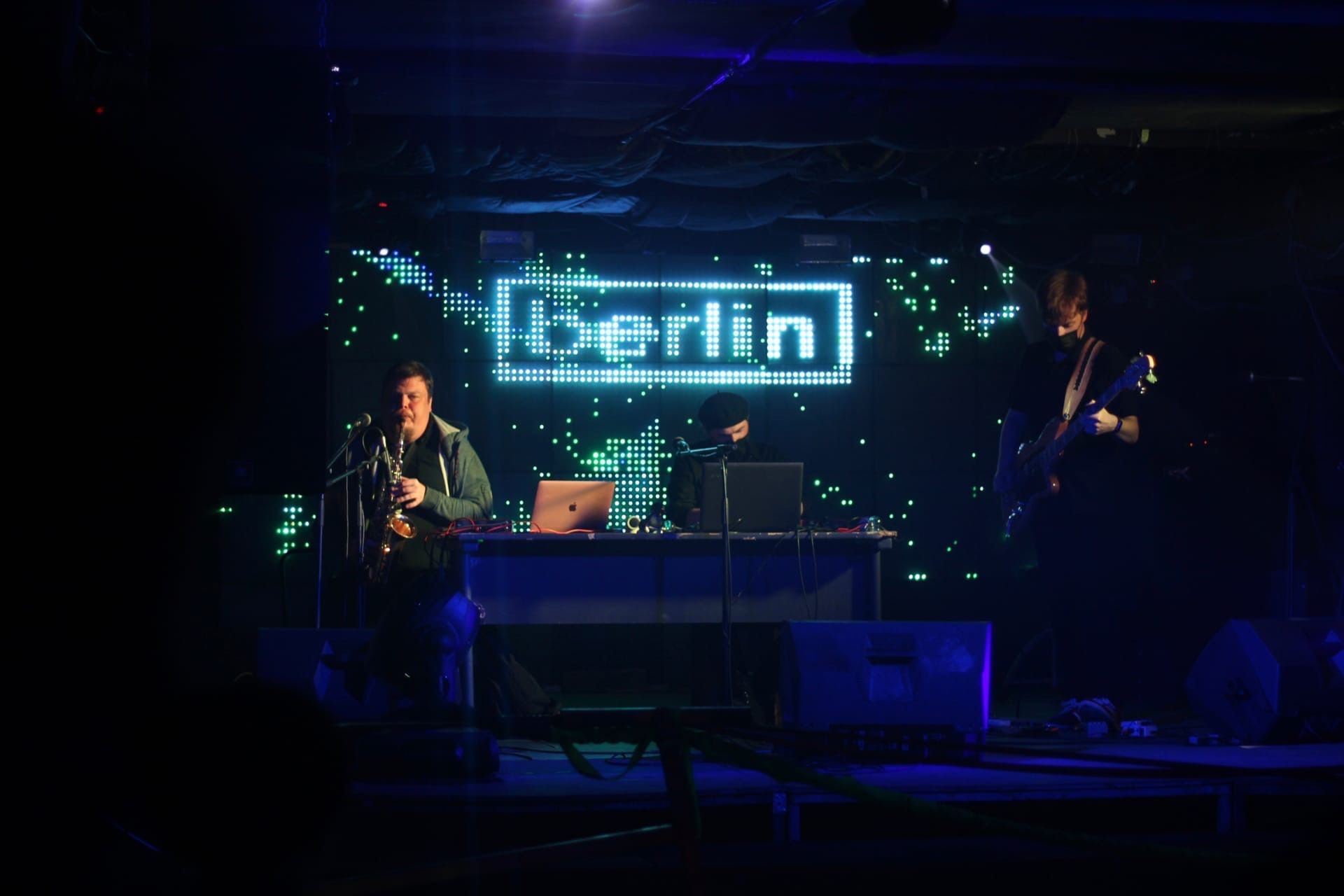
– Raman has recently moved to Warsaw. What are your plans now as a band?
Raman Žarabcoŭ: First of all, with our unpublished archives we have enough material to release for another year (and indeed, during the preparation of this interview, the band released a new album, Factory Method – editor's note). We have tried doing things remotely, but that was not clicking. It lacks the immediacy of people playing in the same room. We also tried some online jamming software – that was better, but there are still technical issues to be ironed out. Of course we would love to play live together, but travel is a bit of a hassle nowadays.
Serge Mokrinsky: We still have a ton of unrealized ideas that we fill spreadsheets with. We keep exchanging all sorts of musical material and discussing ideas all the time. We are completely DIY too – from the cover art to mixing and mastering – we do it all ourselves and we love it. We don't feel like we ever stopped the band. Of course we'd love to just meet up and jam together. I was in Warsaw this summer and met with Raman, but unfortunately, we did not manage to play together. We are obsessed with improvising and I even thought we could jam live during this interview somehow. I even threw a synth in my backpack just in case. Experimenting and improvising is part of our lives. If we ever move to another place, we will definitely come together and perform as Kolorit Kulmana. That will be legendary.
